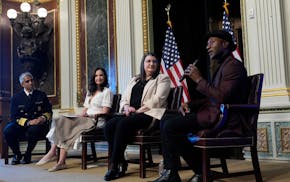BOSTON — The Massachusetts Institute of Technology didn't seek the federal prosecution of free-information activist Aaron Swartz and remained neutral throughout his legal case, according to an internal review of the school's actions.
The 26-year-old hanged himself in January as he faced a trial in Boston following allegations that he surreptitiously used MIT's network to download millions of articles from a scholarly archive with the goal of making them freely available.
But Swartz's father, Robert, said in a statement Tuesday that the report showed MIT wasn't neutral and "played a central role in Aaron's suicide."
He said the school favored the prosecution by providing access to witnesses that the defense didn't get and by handing over information without subpoenas.
Aaron Swartz had been facing 13 felony charges and decades behind bars when he committed suicide in New York City, and supporters said the case was weighing heavily on him at the time.
Prosecutors defended their actions after his death and said they hadn't been seeking maximum penalties against Swartz. His lawyer had said prosecutors offered a plea deal where he would have to admit to 13 felonies and spend four to six months in prison, but Swartz didn't want to be labeled as a felon.
U.S. Attorney Carmen Ortiz described the case at one point by saying "stealing is stealing, whether you use a computer command or a crowbar." After his suicide, she extended sympathy to Swartz' loved ones while continuing to defend the charges.
In the aftermath, friends and supporters suggested MIT wrongly assisted federal prosecutors.
"If the university had said publicly, 'we don't want this prosecution to go forward' there would have been no case and Aaron would be alive today," said a statement Tuesday from activist group Demand Progress, which Swartz once led as executive director.
Swartz was viewed as a leader in a movement to make information available on the Internet for free. He helped develop the social news site Reddit in its early years and helped create RSS, a technology for bringing together content from blogs, podcasts and other outlets without visiting websites one by one.
Swartz was not an MIT student. His father is a consultant to the school and Swartz had various informal connections to it.
MIT's review panel raised concerns about policies and procedures but university President L. Rafael Reif said it made clear that the school didn't target Swartz, didn't seek his federal prosecution and didn't oppose a plea bargain. It found no wrongdoing on the school's part.
Hal Abelson, the MIT computer science and engineering professor who headed the inquiry, said Tuesday that MIT never made statements supporting the prosecution or the defense and never weighed in on potential punishments for Swartz. He said the university also declined to intervene with the U.S. attorney's office on Swartz's behalf after his family asked the school to do so.
The professor said the panel found MIT didn't intentionally involve federal officials in the investigation. The Secret Service came with Cambridge police when MIT police asked for help after a laptop was found in a computer wiring closet, he said.
The professor also said during a conference call with reporters that officials worked as an independent review panel while analyzing the school's involvement and "did not attempt to be judgmental."
While critical of the school's actions, Robert Swartz said he was encouraged by Reif's "desire to ensure that something positive comes of the terrible, tragic situation in which Aaron found himself."
The father, who said at his son's funeral that he was "killed by the government," also applauded the university for "its commitment to self-examination." He asked to be involved in MIT community discussions to explore subjects that arose because of his son's case.
Swartz's girlfriend, Taren Stinebrickner-Kauffman, called MIT's report a "whitewash" and said its behavior was "reprehensible." She said MIT's lawyers gave prosecutors total access to witnesses and evidence but refused to do the same for Swartz's lawyers.
MIT's president said the school's decisions were "made in good faith."
The authors of the 182-page report concluded that MIT missed an opportunity to demonstrate leadership.
MIT "is respected for world-class work in information technology, for promoting open access to online information, and for dealing wisely with the risks for computer abuse," it said.
While university didn't do anything wrong, it had nothing to be proud about either, the panel concluded.
Phish fans are famously dedicated. What happens when they enter the Sphere?
Minneapolis will bid to host Sundance Film Festival

Icehouse on Eat Street in Mpls. facing eviction for unpaid rent
